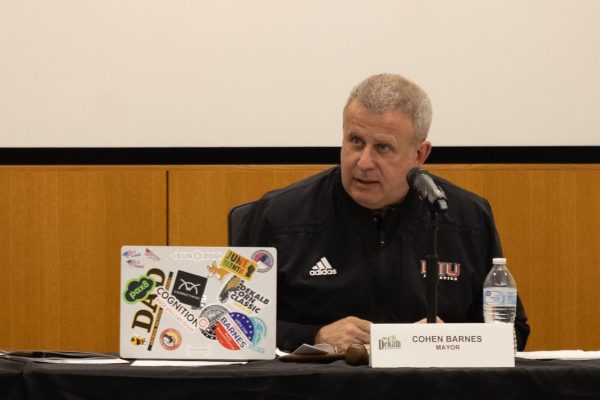Regents increase salaries
October 21, 1988
NORMAL—A 17.2 percent retroactive salary increase was approved for NIU President John LaTourette by the Board of Regents Thursday, raising his annual salary to $97,500 for fiscal year 1989.
The Regents also approved a retroactive 8.2 percent salary increase for Regents Chancellor Roderick Groves, which will raise his annual salary to $114,650.
Groves said the salaries for presidents and the chancellor are usually set in July or September by the Regents. He said the Board of Governors and SIU this year set their chief executives’ salaries in September and October.
Since FY89 began in July, the increases approved Thursday will be retroactive, and the executives will get back pay from July of 1988, Groves said.
The Regents also approved a six percent increase for Tom Wallace, Illinois State University president. NIU’s and ISU’s presidents now both make $97,500.
Regents Chairwoman Carol Burns said the purpose for the increases was to make the two presidents’ salaries comparable.
“While these new salaries will make us more competitive, it still leaves us on the downside,” she said.
Presidents’ salaries at the University of Illinois and Southern Illinois University still are higher than those of Regency system university presidents, she said.
The Northern Star has learned that the Regents began discussion of the salary increases during a closed session in July.
The Regents met Wednesday in closed session for more than two hours to discuss legal matters at ISU, land acquisition at NIU and collective barganing at the chancellor’s office, Burns said.
NIU Student Regent Nick Valadez presented a resolution to the Regents asking that faculty, chancellors’ staff and administrators receive the same percentage of salary increases if the Regents could afford it.
But later, Valadez withdrew his resolution because of confusion it caused among Regent members.
“The intent of the resolution was to demonstrate that the board recognize the appearance of impropriety in regard to the salary increases,” Valadez said. “Since its defeat was imminent, I withdrew the resolution. Its defeat had the potential to embarass the board, which was not my intent.”
Burns said, “I think that the resolution was unclear and misleading about how the board goes about setting salaries.” She said the board always tries to be fair, but that does not mean that the salary increases will be equal.
Jon Dalton, NIU vice president for student affairs, said, “I think the resolution is trying to have the board state what it is already committed to doing.”
“I agree with the spirit of the resolution,” said Brian Hopkins, Sangamon State University student Regent. “I think that the intent (of the resolution) was good. I think the CEOs’ performances are outstanding. They deserve what they receive.”
NIU Provost Kendall Baker commended the “extremely professional job done by President LaTourette in the last year,” and said he agreed with the Regents’ rationale for raising executive salaries.
Valadez said he presented his resolution because he wanted to dispel misconceptions at universities that the Regents are treating presidents and the chancellors differently than faculty and administrators. “Sometimes we (the Regents) forget that every action sends a message to thousands of students and faculty.”
Groves said there might be a perception problem but said he did not think there should be. “The community should want strong leadership.”
Groves said that if NIU was conducting a search for a president, the university would “strongly object” to paying a bargain basement price. Faculty and students should recognize that it is not desirable or appropriate for their university to be shortchanged, he said.












